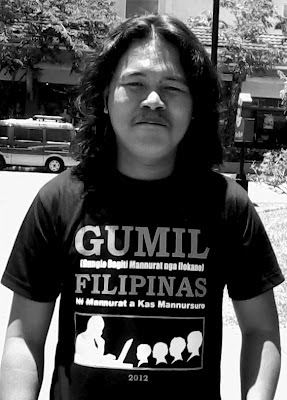Sawikaan 2010: Word of the Year Conference in UP Diliman
The Filipinas Institute of Translation (FIT), Inc. in cooperation with the Blas Ople Foundation, Anvil Publishing, DepEd, CHED, U.P. Sentro ng Wikang Filipino, and the U.P. College of Arts and Letters will hold Sawikaan 2010: Pambansang Kumperensiya sa Salita ng Taon on July 29-30, 8:00am-5:00pm at the Pulungang Claro M. Recto, Bulwagang Rizal, Diliman, Quezon City.
In 2007, “miskol” was declared word of the year because it perfectly captured the Filipino style of appropriating a foreign communication practice to suit the local mores. The conference was not held in 2008 and 2009, as the organizers believe no words came out at that period worthy of the title. It follows then that there is now enough word contenders for the event’s revival.
Old or new words will be considered by the judges as possible word of the year as long as these impacted on the sociocultural, political, social, economic, and other aspects of Filipino life in the last two years. These could be borrowed from a foreign or a local language, or an old one that has acquired a new meaning. The word of the year is a significant addition to Filipino vocabulary and a welcome dictionary entry. As in the previous years, Sawikaan has invited language experts to talk about how to further develop the Filipino national language. Speakers for the July 29 sessions include Dr. Mario I. Miclat, the dean of the U.P. Asian Center; Dr. Zeus Salazar, the respected historian; Dr. Jaime Caro, computer scientist; and Dr. Jesus Federico Hernandez, the Chair of the U.P. Department of Linguistics. Topics to be tackled are neologism, lexicon from non-English languages, computer technology and language, and contribution from the gay subculture.
The revised edition of the UP Diksiyonaryong Filipino (Anvil Publishing) will be launched after the fora. National Artist for Literature Virgilio S. Almario is the editor of the dictionary.
On July 30, ten to twelve proponents will present their papers. Entries in the running include “jejemon, “unli,” “load,” “tarpo,” “spam,” “solb,” “emo,” “namumutbol,” “Ondoy,” and “Ampatuan.” Presentations will be judged according to the paper’s outstanding research, power of evidence and argumentation, and quality of writing. The Blas Ople Foundation will give cash prize to the first, second, and third best papers. The Sawikaan papers will be published as a book.
In 2007, “miskol” was declared word of the year because it perfectly captured the Filipino style of appropriating a foreign communication practice to suit the local mores. The conference was not held in 2008 and 2009, as the organizers believe no words came out at that period worthy of the title. It follows then that there is now enough word contenders for the event’s revival.
Old or new words will be considered by the judges as possible word of the year as long as these impacted on the sociocultural, political, social, economic, and other aspects of Filipino life in the last two years. These could be borrowed from a foreign or a local language, or an old one that has acquired a new meaning. The word of the year is a significant addition to Filipino vocabulary and a welcome dictionary entry. As in the previous years, Sawikaan has invited language experts to talk about how to further develop the Filipino national language. Speakers for the July 29 sessions include Dr. Mario I. Miclat, the dean of the U.P. Asian Center; Dr. Zeus Salazar, the respected historian; Dr. Jaime Caro, computer scientist; and Dr. Jesus Federico Hernandez, the Chair of the U.P. Department of Linguistics. Topics to be tackled are neologism, lexicon from non-English languages, computer technology and language, and contribution from the gay subculture.
The revised edition of the UP Diksiyonaryong Filipino (Anvil Publishing) will be launched after the fora. National Artist for Literature Virgilio S. Almario is the editor of the dictionary.
On July 30, ten to twelve proponents will present their papers. Entries in the running include “jejemon, “unli,” “load,” “tarpo,” “spam,” “solb,” “emo,” “namumutbol,” “Ondoy,” and “Ampatuan.” Presentations will be judged according to the paper’s outstanding research, power of evidence and argumentation, and quality of writing. The Blas Ople Foundation will give cash prize to the first, second, and third best papers. The Sawikaan papers will be published as a book.



Comments
Post a Comment